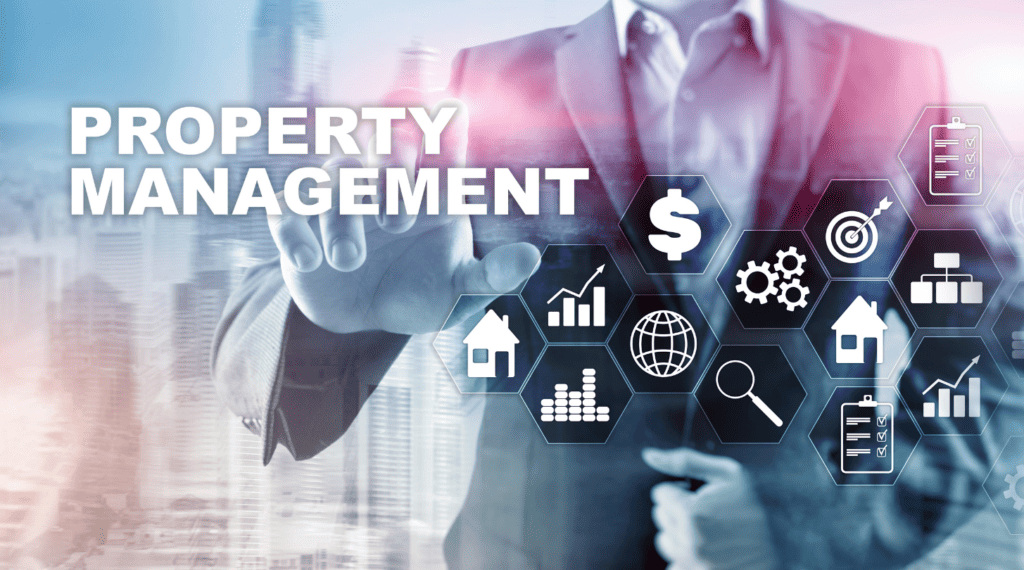Property management stands as a critical, often overlooked component of success. Effective management of business properties is not merely about maintaining structures and grounds—it's about creating environments that enhance productivity, embody the corporate ethos, and respond to the evolving needs of the business.
Table of Contents
This post is crafted to guide business owners, property managers, and investors through the multifaceted aspects of managing commercial properties efficiently.
From strategic planning, and financial oversight, to operational excellence, this guide offers insights into optimizing property performance, maximizing returns, and creating spaces that inspire innovation and growth.

Whether you are new to property management or looking to refine existing practices, this guide serves as your comprehensive resource for navigating the complexities of the property management landscape.
Strategic Planning
Strategic planning in property management begins with a vision for the property that aligns with business goals and market demands. It requires a deep understanding of the demographic trends, local real estate market conditions, and the specific needs of potential tenants.
This understanding helps in setting achievable goals and crafting strategies tailored to enhancing the property's value and appeal.
A thorough market analysis can reveal opportunities for differentiation and positioning the property to attract premium tenants. Regular reviews and updates to the strategic plan ensure that it remains relevant and effective in the rapidly changing market landscape.

The layout and design of the property are crucial aspects to consider in strategic planning. The right mix of amenities, services, and common areas can enhance the overall appeal of the property and attract high-quality tenants.
Adopting sustainable practices such as using energy-efficient materials, incorporating green spaces, and implementing waste management strategies not only benefits the environment but also reduces operational costs.
Research different high-quality metal stairs and railings for commercial properties to find the best fit for your property's design and style. Also, incorporating technology into the property's infrastructure can improve efficiency and attract tech-savvy tenants.
Financial Oversight
One of the primary challenges in financial oversight is managing costs effectively without compromising the quality or appeal of the property. This balancing act requires a keen understanding of where investments yield the highest returns.
Regular maintenance and strategic upgrades can significantly enhance the property's value, making it more attractive to potential tenants and thereby increasing revenue potential.
At the same time, it's crucial to keep a tight rein on unnecessary expenditures and negotiate contracts with vendors to ensure cost-effective services without sacrificing quality. Another key aspect of financial oversight involves optimizing the property's revenue streams.
This can be achieved through various strategies such as competitive pricing, dynamic lease terms, and adding value-added services that tenants are willing to pay a premium for. Understanding the needs and preferences of your target market is essential in this regard; it enables the property to stand out in a competitive market.
Additionally, leveraging technology for property management can streamline operations, reduce costs, and improve the overall tenant experience, thereby enhancing the property's desirability and profitability.
Accurate financial reporting and thorough analysis form the backbone of effective property management. Regular, detailed reports provide a clear picture of the property's financial performance, making it easier to identify trends, spot potential issues before they escalate, and make informed decisions.
These reports should cover income, expenses, occupancy rates, and other key financial metrics. Analysis of this data allows property managers to adjust strategies as necessary, ensuring that the property remains aligned with market conditions and business objectives.
Investing in robust property management software can simplify this process, offering real-time insights and facilitating strategic decision-making.
Operational Excellence
Achieving operational excellence in business property management involves a blend of efficient processes, skilled personnel, and the effective use of technology. It is about ensuring that all facets of property management work seamlessly to provide a superior experience for tenants and optimum performance of the property.
Key to this is the development of a comprehensive operations plan that details routine maintenance schedules, emergency response strategies, and tenant relationship management.
This plan should be built on a foundation of strong communication channels between property managers, tenants, and service providers to ensure swift resolution of any issues and regular updates on property developments.
Enhancing operational efficiency further requires a commitment to adopting innovative solutions, such as automated systems for service requests, payments, and communications, which can significantly improve responsiveness and tenant satisfaction.
In addition to leveraging technology, fostering a culture of continuous improvement among staff is essential for operational excellence. This involves regular training and development opportunities, along with the encouragement of feedback and ideas on how to streamline operations.
Property managers should also focus on building robust relationships with reliable vendors and contractors who adhere to high standards of quality and service. This not only ensures that maintenance and repairs are carried out effectively but also helps in negotiating favorable terms that can lead to cost savings.
Ultimately, operational excellence in business property management is not just about the day-to-day running of the property but also about strategic thinking and planning for the future, ensuring that the property continues to meet the evolving needs of tenants and remains competitive in the market.
Tenant Relations
Maintaining positive and engaging tenant relationships is pivotal to the success and longevity of any commercial property management endeavor. Establishing clear, consistent communication channels is the foundation of strong tenant relations, allowing for prompt addressing of concerns and fostering a sense of community among occupants.
Property managers need to go beyond mere transactional interactions, instead focusing on creating genuine connections. Regularly scheduled meetings, tenant appreciation events, and feedback surveys are effective ways to keep tenants satisfied and engaged.
Additionally, leveraging technology for more efficient communication, such as tenant portals for requests and complaints, can significantly enhance the tenant experience by making interactions more convenient and responsive. Another critical aspect of tenant relations is the swift and effective resolution of disputes and maintenance issues.
This not only demonstrates the property manager's commitment to providing a high-quality environment but also helps in building trust and loyalty among tenants. Proactive management practices, such as regular inspections and preventative maintenance, can prevent many common issues from arising.
When disputes do occur, property managers need to act as neutral mediators, facilitating fair and equitable resolutions promptly. This approach not only ensures the longevity of tenancy agreements but also contributes to a positive reputation in the wider market, attracting future high-quality tenants.
Risk Management
Risk management involves identifying, assessing, and mitigating risks that could potentially affect the property's value, operations, or reputation. This includes everything from physical hazards to financial and legal risks.
Proactive risk management strategies, such as implementing safety protocols, purchasing appropriate insurance policies, and adhering to legal and regulatory requirements, are crucial for protecting the property and its stakeholders from unforeseen events and liabilities.
Regular audits and inspections can identify potential hazards and areas for improvement, allowing property managers to take action before they become major issues.
Maintaining accurate records and documentation, including leases, maintenance records, financial reports, and contracts, is essential in mitigating legal risks and ensuring compliance with regulations.
Sustainability Practices
Incorporating sustainability practices into property management not only benefits the environment but also enhances the property's appeal to tenants and investors.
Energy-efficient lighting, water-saving fixtures, and green building certifications are examples of sustainable initiatives that can reduce operating costs and promote a healthier, more appealing environment.
Adopting sustainability practices requires a commitment to continuous improvement and innovation. Property managers should stay informed about the latest green technologies and sustainability trends to ensure that their properties remain competitive and environmentally responsible.
Collaborating with tenants and stakeholders can also facilitate the implementation of sustainability practices, creating a shared vision for a greener, more sustainable future.
Technological Integration
The integration of technology into property management processes can significantly improve efficiency, accuracy, and tenant satisfaction.
From property management software systems that streamline administrative tasks to smart building technologies that optimize energy use, technology plays a key role in modernizing properties and enhancing their performance.
Staying abreast of technological advancements and evaluating their applicability to property management is essential for maintaining a competitive edge.
This includes not only the adoption of new technologies but also the training of staff to effectively utilize these tools. Leveraging technology can not only improve tenant satisfaction and streamline operations but also attract tech-savvy tenants who value modern, efficient properties.
Community Engagement
Engaging with the wider community can enhance the reputation of a business property and contribute to a vibrant, supportive environment around it. This might involve participating in local business associations, sponsoring community events, or implementing community improvement projects.
Creating strong community connections can lead to increased local patronage, positive word-of-mouth, and an overall enhancement of the property's standing in the community. Property managers should look for opportunities to engage and contribute positively to the surrounding community.

In the intricate world of commercial property management, the balance between strategic insight, operational diligence, and a focus on sustainability and technology is paramount.
This guide has traversed the broad spectrum of managing commercial properties, from the foundational importance of strategic planning and financial oversight to the operational excellence and tenant relations that form the heartbeat of successful property management.
At each step, the infusion of sustainability practices, technological integration, and community engagement has been highlighted as not just beneficial, but integral to staying competitive and fulfilling the evolving demands of tenants and the market.
Guide to Successful Business Property Management – FAQs
Q1: How can property managers effectively reduce operational costs without compromising on quality?
A1: Property managers can reduce operational costs by implementing energy-efficient systems, negotiating favorable contracts with vendors, and using property management software to streamline operations. Regular maintenance and strategic upgrades also prevent costly emergency repairs, contributing to long-term cost savings.
Q2: What strategies can be employed to enhance tenant satisfaction and retention?
A2: Enhancing tenant satisfaction involves regular communication, prompt resolution of maintenance issues, and adding value through amenities and services. Organizing tenant appreciation events and incorporating feedback mechanisms also play a significant role in retaining tenants.
Q3: How does technology improve property management operations?
A3: Technology streamlines various aspects of property management through automation and real-time data access. Property management software can simplify tasks such as rent collection, maintenance requests, and financial reporting, enhancing efficiency and reducing the likelihood of errors.
Q4: What are some essential risk management strategies for commercial properties?
A4: Essential risk management strategies include conducting regular property inspections, purchasing comprehensive insurance coverage, and adhering to all regulatory requirements. Implementing strict safety protocols and keeping detailed records also mitigate risks effectively.
Q5: How can commercial properties be made more sustainable?
A5: Making commercial properties more sustainable can be achieved through the installation of energy-efficient lighting and water-saving fixtures, promoting recycling and waste reduction among tenants, and seeking green building certifications. These initiatives not only benefit the environment but also reduce operational costs and appeal to eco-conscious tenants.



